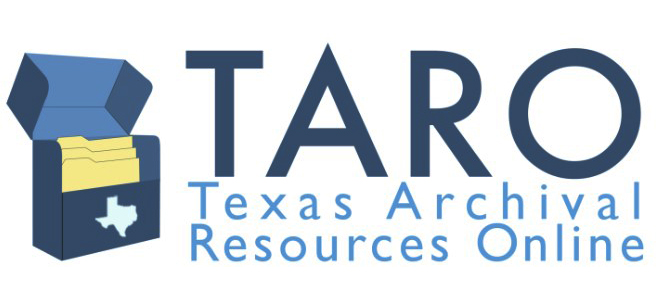TARO–The Texas Archival Resources Online

by Suzan Younger
Family historians can find real gems “hidden” in manuscript collections in archives, libraries, and museums with some extra research effort. However, researchers do not access manuscript collections the same way they use a library catalog. Let’s first define a manuscript. It is a book, document, or piece of music that is handwritten or typed but not printed and published. A manuscript collection can include letters, unpublished books, scrapbooks, photographs, business records, memorabilia, ephemera, and other material. A collection might include published material.
Archives, libraries, and museums (repositories) create “finding aids” that describe the contents of the manuscript or manuscript collection. A finding aid is more like a table of contents and is not an index, although a third party might create an index for all or part of a collection. The repository will assign a unique collection number to be used to request access to the collection. Unless they have extreme historical interest or value, many, if not most, manuscript collections are not digitized. Fortunately, genealogical organizations like FamilySearch and Ancestry are now working with archives to digitize genealogically rich manuscript collections. But an in-person trip to a repository is still necessary for most archival material.

The University of Texas Austin Libraries have created an invaluable website named the Texas Archival Resources Online or TARO. TARO comprises finding aids and collection descriptions found in select Texas libraries, museums, and archives. The first search box on the website allows a search by finding aid, by subject, or by collection name. You can limit the search by repository and limit the results to digitized collections. The advanced search gives more options, including a collection’s title, creator, geographic area, language, and subjects by topic, person, or organization.
The researcher can browse the site by creator, geographic area, subject, or repository. There is the option for advanced search or data mining using an API (application programming interface.) The site has a map of the institutions participating in TARO. The home page will list recently added fining aids and will spotlight a participating repository.
A finding aid on TARO might list the following information.
- Collection Summary
- Creator
- Biographical Note
- Titles
- Date
- Abstract
- Accession Number
- Extent
- Language
- Repository
- Collection Details
- Administrative History
- Sources
- Scope and Contents Note
- Arrangement
- Collection Restrictions
- Access Restrictions
- Use Restrictions
- Administrative Information
- Preferred Citation
- Access Information
- Processing Information
- Other Resources
- Subject Terms
- Subjects: Persons, Organizations
- Places
- Document Types
- Inventory Information and/or Detailed Description of the Collection
An excellent example of a collection’s finding aid in the Dallas History and Archives Division of the Dallas Central Library is the Juanita Craft Collection.
North Texas repositories taking part in TARO include:
- Dallas History and Archives Division of the Dallas Central Library
- Dallas Historical Society at Fair Park
- Dallas Municipal Archives
- Southern Methodist University
- The University of Texas Arlington Library, Special Collections
- University of North Texas Special Collections
- Texas Woman’s University, Woman’s Collection
- Emily Fowler Central Library, Denton Public Library
- Fort Worth History Center
- Fort Worth Jewish Archives
- Texas Christian University’s Special Collections
- University of Texas Dallas
TARO is an excellent site to include in your genealogical toolbox. Be sure to check back frequently for recent additions to the site.

